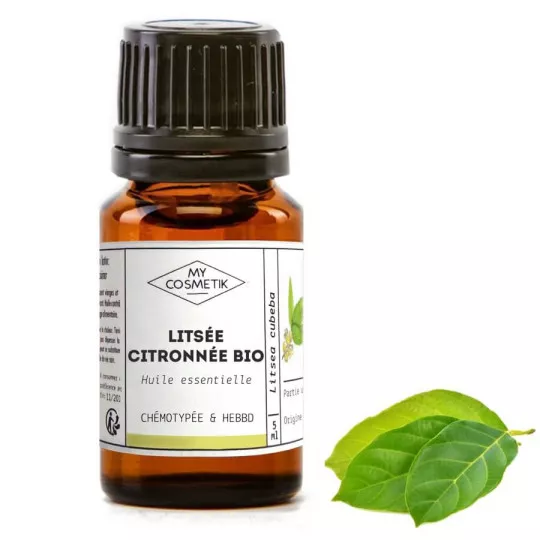Organic essential oil of exotic verbena (litsée lemon)
With a chemotype quite close to that of verbena, lemon bedsea essential oil can easily replace the latter in the event of a stock shortage. Less expensive, it has an equally pleasant fragrance and similar virtues.
Our organic labels: ORGANIC & HEBBD essential oil, from Organic Farming (AB) controlled and certified by ECOCERT France SAS FR-BIO-01.
Lemongrass essential oil is often used as an insect repellent. Its fresh, lemony smell is often considered sweeter than Java lemongrass or lemongrass, which makes it very pleasant to use in diffusion. It has exceptional soothing properties and can be used in diffusion or massage to ward off the blues. Its internal use is not prohibited but less frequent in daily practice. Lemon bedgrass essential oil resembles lemon verbena in composition and properties. Lemon litsea essential oil easily replaces the latter which is much more expensive.
Cosmetic properties:
With a chemotype quite close to that of verbena, lemon bedsea essential oil can easily replace the latter in the event of a stock shortage. Less expensive, it has an equally pleasant fragrance and similar virtues.
Carefully selected by our quality department, each batch is scrupulously analyzed, controlled (geographic origin, appearance, physicochemical criteria) and chemotyped in order to guarantee a constant and maximum concentration of aromatic molecules and active ingredients.
Organoleptic properties:
Botanical name: Litsea cubeba
Part of the plant used: berries
Origin: China, Vietnam
Color: yellow to orange
Smell: lemony, flowery, pleasant and fresh
Culture: organic farming
Extraction method: total and complete steam distillation (our essential oil contains all of the aromatic principles of the plant), extracted without solvent, non-terpene.
Botanical family: Lauraceae
Yield: 3 to 5%. This means that it takes 20 to 33 kg of lemongrass berries to obtain 1 kg of lemongrass essential oil. Yield may vary depending on season, region, type of crop, or from one year to the next. The lower the yield, the more valuable and expensive the essential oil will be.
Solubility: All essential oils are soluble in oil or oily raw materials. To mix an essential oil in water, it must first be dissolved in a dispersant such as Disper
Precautions for use:
Do not use in pregnant or breastfeeding women.
Do not use in children under 8 years old.
Do not use in case of hormone-dependent problems or mastosis.
Utero tonic: NEVER use during pregnancy.
Follow the precautions for using essential oils.
For any use of essential oils for therapeutic purposes, consult a doctor.
The information given on the site does not constitute a prescription, it remains data for informational purposes, it does not engage our responsibility in any way.
In general, do not use pure essential oil on the skin or mucous membranes.
Essential oils should not be applied to the eyes, around the eyes, or in the ears.
Storage: away from light and heat.
Keep out of reach of children.
Always close the bottle correctly.
Once the user has seen at least one product this snippet will be visible.
